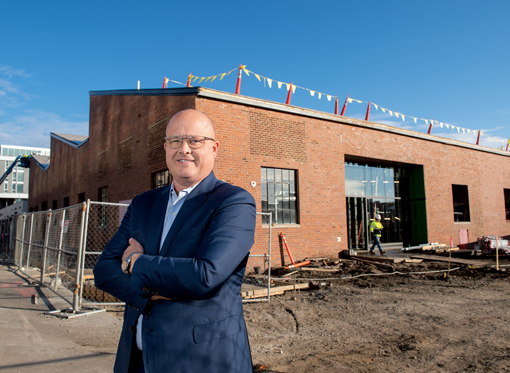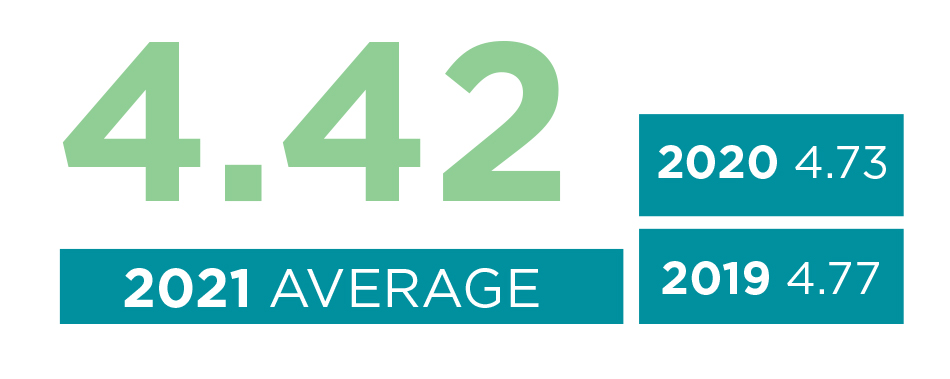Leaders Survey 2021: Finding talent, work arrangements top concerns
Focus on equity initiatives, placemaking and workplace culture seen as solutions

BPC Staff Nov 22, 2021 | 8:15 pm
23 min read time
5,544 wordsBusiness Record Insider, Economic DevelopmentThe results of our 2021 Leaders Survey show that our leaders are now more comfortable with the uncertain times we live in. Maybe comfortable isn’t the right word – but I saw a clear difference when reading this year’s results compared with last year’s.
In 2020, the world and our community seemed to pause and ponder: How could we possibly go on with anything else in the midst of a pandemic? And many things were put on hold around the world. Our 2020 survey results came in just a couple of months before the vaccine rolled out across the United States. In 2021, the world and our community seems to be asking almost the opposite question: How can we continue to go on with everything else even in the midst of a pandemic?
Our annual survey asks business leaders to share what they feel are some of the top issues affecting business in Central Iowa, and in particular the Greater Des Moines region. As you read, you’ll see the responses and also select remarks from those who opted to leave comments as they took the survey. This is not scientific, but it gets a pulse on the community.
Workforce challenges have been a top concern for years, but this year’s responses paint a picture showing that many industries are truly at a crisis point when it comes to finding talent. The pandemic has magnified the need to focus on issues related to equity, child care, wages and more that some business leaders were already working on before 2020.
This year’s guest editor has also provided analysis of the results. Jake Christensen is the founder and president of Christensen Development. He is passionate about being engaged in the community and especially knowledgeable about downtown development. We’d like to thank him for taking time out of his busy schedule to provide excellent insight.
We hope you find these answers thought-provoking. Enjoy!
– Emily Barske, editor
Meet our guest editor
Jake Christensen founded Christensen Development in 2003 with a passion for urban development. The company’s mission is to transform not just individual sites, but entire areas of the city into thriving community centerpieces. While the Christensen Development team may be small, it has accomplished big things, completing $500 million in projects in a three-state area.
Alongside his development work, Christensen is passionate about volunteering and community involvement. Currently, he serves as a member of the Des Moines Airport Authority, a member of the Greater Des Moines Partnership executive committee, co-chair of the Downtown Community Alliance, co-chair of the Downtown Vision Plan, co-chair of the Tocqueville Society Campaign and a member of the Greater Des Moines Water Trails Advisory Committee. He was named 2018 Commercial Real Estate Professional of the Year, was a member of the 2005 Greater Des Moines Leadership Class, was a 2005 Business Record Forty Under 40 honoree, and was named the Des Moines Community Champion by the Greater Des Moines Partnership and the Des Moines Business Record in 2015.
Rate the overall health of the Central Iowa business community.
(Scale of 1-10, 1 being weakest)
Guest Editor Jake Christensen:
Central Iowa leaders have faith in the resilience of our community and believe we are positioned better than most surrounding Midwest metros for strong recovery. Leaders cite the fiscal health of our state, strong collaboration by business leaders and generally see abundant opportunities for growth. With that said, leaders cite workforce and supply chain issues and major concerns. The resulting rise in inflation and inability to grow despite an abundance of business opportunities caused leaders to rate the health of our business community lower than pre-pandemic years. I agree with the faith in our community, but our region is combating the supply chain challenges as well as workforce shortages that are holding back our progress.
Wade Hiner, president, sales and marketing, Destiny Homes
10. ABI members in Central Iowa report strong sales and bottom-line revenue growth year to year.
Mike Ralston, president, Iowa Association of Business and Industry
8. I think the overall health is pretty strong, but I don’t think it’s spread evenly among the most diverse communities.
Matthew McIver, artistic director, Iowa Stage Theatre Company
8. Supply chain has affected the pace of construction and the cost of materials. Commercial construction was straining under the abundance of open office space and remote working, and supply chain is exasperating.
Bryan Myers, senior vice president, Neumann Brothers
8. We know some individuals and organizations were hit hard in the pandemic and are still recovering. However, there is one word that captures what we are seeing and hearing with our business clients right now: opportunity. Many are flush with cash and looking to invest in research and development, workforce talent, and future ventures.
Don Coffin, CEO and president, Bankers Trust Co.
8. Continued soft spots in adjacent rural Iowa markets, continued disparity in incomes, but real estate, bank, insurance and low unemployment are driving economic growth overall.
Jed Gammell, vice president of insurance, Lincoln Savings Bank
7. Iowa, and our region in particular, seems to have come through the last 18 months better than most. I’d chalk that up to a fiscally healthy state and a strong, positive relationship with the business community led by the Greater Des Moines Partnership.
Mike McCoy, CEO, NCMIC
7. The Greater Des Moines (DSM) region continues to show tremendous resiliency as we continue economic recovery from the pandemic. DSM continues to outpace surrounding major Midwest metros in population growth, real gross domestic product growth and employment growth over the past decade. We have received numerous national rankings this year pointing to our region being a place that is poised for a strong recovery. Major projects have continued to move forward, including the now-completed Lauridsen Skatepark, the now-open MidAmerican Energy Company RecPlex, the Iowa Confluence (ICON) Water Trails, the Pro Iowa Soccer Stadium and Global Plaza, the new Des Moines Buccaneers Arena, the Des Moines Industrial Transloading Facility and more.
Jay Byers, president and CEO, Greater Des Moines Partnership
7. Several businesses are still struggling, but generally a positive environment.
Carol Olson, state director, U.S. Senate
7. I think we have a strong business community to move initiatives forward, but are at risk of talent loss to other markets.
April King, organizational change coach, American Enterprise Group
7. I see many new and existing businesses responding to the evolving challenges presented to them, pivoting as needed to thrive. However, there are also businesses, particularly evident in restaurants, who have challenges that have been difficult to overcome.
Stephanie Gott, vice president of human resources, Kreg Tool
7. Labor is an issue that everyone is dealing with. We can’t get the full economy going until we have everyone vaccinated. The economy is strong if we let it be just that.
Robert Lewis, owner, Quester
7. Central Iowa has an excellent tradition of being future thinking during uncertain times. Maintaining that tradition is crucial to coming out of this transition thriving. Having a vision of making Central Iowa, and more broadly the state, a great place to live, work, and raise a family should be our top priority.
Hannah Inman, CEO, Great Outdoors Foundation
7. The pandemic is still impacting many sectors of business and one of the most visible results is reduced hours/days of operation. The service industry continues to have difficulties with staffing shortages and many tourism industries are still down significantly from pre-pandemic years.
Jaime Nicolet Rutan, curator, Salisbury House Foundation
6. The economy and the rising inflation will affect all families – especially lower and middle income. COVID and politics are dividing the populace so there will be less cooperation on so many fronts. All of this will affect, in a growing manner, the weakening of the economy.
Terry Ebke, director, LegalShield / IDShield
6. Supply chain issues have hamstrung growth. We like to blame COVID, but supply chain experts and government officials have been warning of a potential goods and materials breakdown for a decade.
Michelle Book, CEO, Food Bank of Iowa
5. The Central Iowa community could be more efficient and effective in its use of resources, most importantly people (workforce) and technology, and this would reduce the strain of employment needs, increase productivity, and reduce cost. This is a massive economic opportunity that is untapped.
Kevin Schlueter, partner, Reworc
5. I really think it depends on which industry you work in. Some industries are doing very well and others are still hurting. But I do believe that things are looking up, if we can just figure out the workforce challenges.
Tamara Kenworthy, president, On Point Strategies
3. Capitalism always produces winners and losers, but it seems like the gap is widening. Of course, the people at the top of corporate hierarchies rarely if ever suffer. However, the widening socioeconomic fissures within the community should be a concern to everyone.
Mark Core, education advocate, YSS
FILL IN THE BLANK:
The biggest issue facing Iowa businesses right now is _______.
Guest Editor Jake Christensen:
Workforce. Leaders say that attracting and retaining workforce is the biggest issue they are facing. Related concerns such as wage inflation, navigating the post-pandemic “new normal” of remote versus office work, lack of affordable housing and child care, and a generally overworked workforce are major concerns for Central Iowa leaders. I think that the workforce shortage is the prevailing challenge. Our community is poised for continued growth, but our region needs more people to be part of the effort.
Understanding how to be competitive in this new environment.
Hannah Inman, CEO, Great Outdoors Foundation
Labor force.
Bryan Myers, senior vice president, Neumann Brothers
Uncertainty about early-2022 Fed policy and inflation impact on continued economic expansion. Any spike in market interest rates may reverse 2021’s Fed-induced economic gains in profit margins, new construction, retirement account balances, housing values, and ag land values.
Todd Kielkopf, president, Kielkopf Advisory Services
Workforce, followed very closely by supply chain issues.
Deb Bengtson, president, Adel Partners Chamber
For large employers – what to do with an empty office building. For small employers – finding qualified workers.
Kevin Pokorny, owner and consultant, Pokorny Consulting
Lack of qualified and willing workforce in all sectors of the economy.
Jessica Dunker, president and CEO, Iowa Restaurant Association
The need for talent. We continue to work with businesses and organizations on talent development initiatives to ensure our pipeline is developing skills to meet the needs of jobs of the future, and we continue to advance projects and initiatives that will attract diverse and talented people to the region.
Jay Byers, president and CEO, Greater Des Moines Partnership
Future economic growth policies favoring the government rather than the private sector.
Dave Halfpap, board member, Mercy Foundation
Lack of child care and staffing.
Jaime Nicolet Rutan, curator, Salisbury House Foundation
Transitioning back to post-pandemic work culture and determining the dynamics of modified working conditions.
David Bubeck, research director, Corteva Agriscience
High taxes.
Steven Simon, CEO, South Story Bank & Trust
Understanding how to attract and retain talent. What’s the right wage or salary? The right set of benefits? The right balance of working from home or at the office? What worked in the past isn’t working now – the successful enterprises will be the ones who figure out the best way to attract and retain talent.
Alan Feirer, owner, trainer and consultant, Group Dynamic
An available workforce and housing that enables workers to live within close proximity to their place of employment. For many workers in our economy, there are few housing options that are available to them and for which they will qualify. They are above the income limits for Affordable housing with a capital “A” and may not be able to afford high-end rental or ownership opportunities. There is a housing gap in the middle, which is making it difficult for employers to fill positions in the $35-70K annual income range.
Carrie Woerdeman, director of development, Kading Properties
Worker shortage. The most severe worker shortage on record in our country is also affecting many businesses in our region. And many employees are also job-hopping. According to LinkedIn, from May through July, about 57% of job switches were from one industry to another. As an employer, Bankers Trust has been relatively fortunate on our entry-level branch positions to hire and train talent from other industries. And like every business, we’re more focused than ever on culture, retention and being the kind of place people want to work.
Emily Abbas, senior vice president, chief consumer banking and marketing officer, Bankers Trust Co.
How prepared do you perceive Iowa businesses/governments to be in protecting or defending against a cyberattack?
(1 being not prepared at all)
Guest Editor Jake Christensen:
Leaders are very concerned about business and government’s abilities to protect and defend against cyberattacks. Leaders perceive that the threat of cyberattacks is rapidly changing and expanding, which makes this threat especially difficult for small businesses to defend against. There is a growing concern over the evolution of cyberattack tactics, lack of consequences for hackers, and many feel there is a strong need for more education with respect to prevention and mitigation.
6. There is now an industry supporting cyberattackers – their offense is way less expensive than our necessary defense. International cooperation on this seems very thin.
David Foster, senior consultant, Bâton Global
6. The ones using a qualified consultant are in good shape.
Steve Heston, director, client engagement, Pratum
4. With personal identity theft and cyberattacks on businesses, each up over 400% in the recent year, more need to be educated on the ramifications if they don’t take wise steps for education and protection.
Terry Ebke, director, LegalShield / IDShield
4. For most businesses, cybersecurity is an afterthought.
Tray Wade, president and CEO, EveryStep
4. My perception is that cybercriminals are better at what they do than the defenders are at what they do. There is a continuing concern about cybercrime.
John Bergman, president, SPMC LLC
3. The latest ransomware to a grain cooperative indicates all are vulnerable. No one thinks they will get the “virus.”
Robert Riley Jr., chairman emeritus, Riley Resource Group
3. I’m beginning to believe it is impossible to defend against cyberattacks. Until there are real consequences for hackers, they will find a way to attack any company they want, no matter the security measures in place.
Brendan Comito, COO, Capital City Fruit Co.
3. The pace that cyberattacks are happening, utilizing new and different tactics, and the volume of cyberattacks on organizations of all sizes make me deeply concerned about our ability to respond.
Jackie Norris, president, State Public Policy Group and Essman Research
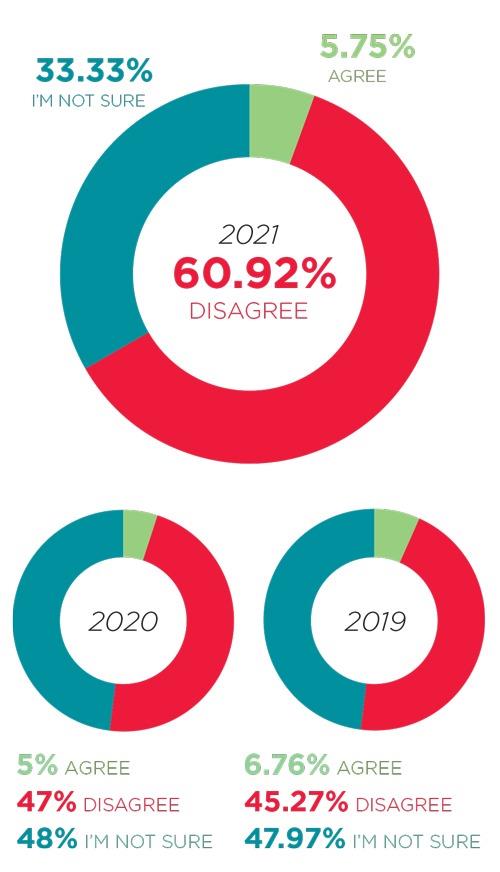
Greater Des Moines has adequate child care/enough affordable child care options.
Agree. Whatever level of options exist, they are enough. Let us not make serfs of our population.
Kenneth Stinson, principal, Northwestern Investments
I’m not sure. Des Moines has many more adequate and affordable child care options than rural Iowa.
Michelle Book, CEO, Food Bank of Iowa
Disagree. This is an ongoing issue in our community, and will remain a drag on our economy.
Matthew McIver, artistic director, Iowa Stage Theatre Company
Disagree. We were behind prior to COVID, and the last 18 months have just made it more difficult.
Kris Saddoris, vice president development, Hubbell Realty Co.
Disagree. No – data clearly indicates there are not enough child care openings for the number of children of working parents.
Eric Burmeister, executive director, Polk County Housing Trust Fund
Disagree. There are both affordability and accessibility issues when it comes to child care options across the state. Child care improvement is a top priority of the Governor’s Economic Recovery Advisory Board and will be a priority for the Partnership in the next legislative session, as it was during the 2021 session.
Jay Byers, president and CEO, Greater Des Moines Partnership
Disagree. Parents who work second and third shifts or weekends have limited access to high-quality affordable child care in Greater Des Moines.
Jackie Norris, president, State Public Policy Group and Essman Research
Disagree. Most women make less than their male counterparts, and with the continuation of increase in child care costs, the more likely women will take the hit and stay home as it would be a “wash” of funds to work and pay for child care.
Jen Cross, vice president of donor relations, Great Outdoors Foundation
Disagree. Child care costs are crazy expensive. $120-$250 a week for one child to be in child care means that an individual is working 12-24 hours a week just to pay their babysitter, and for many, that means they have to work two jobs or at the least have a two-person income coming into their home to pay expenses.
Wanda Price, program manager, Anawim Housing
Businesses and organizations have a responsibility to help pay for their employees’ child care costs.
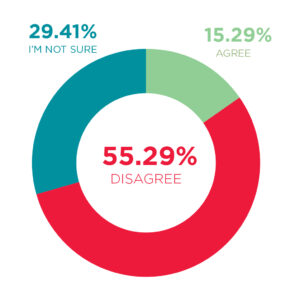
The majority of business leaders agree that it is not the responsibility of businesses and organizations to help employees pay for child care, and cite that to do so would be inequitable to employees without child care needs. But leaders also acknowledge that there is inadequate affordable child care for employees in Greater Des Moines. Leaders say that businesses would be well-served to provide this benefit to employees, but should not be required to do so.
Agree. Businesses have a responsibility to pay their employees a fair and livable wage; that includes a wage that can cover health, housing, food and child care.
Jaime Nicolet Rutan, curator, Salisbury House Foundation
Agree. It is both economically prudent and ethically responsible to ensure the evolving needs that people carry with them into the workplace are addressed. Not only is the child care crisis affecting workplace productivity with an increase in unplanned absenteeism, the data today is very clear the caregiving issue disproportionately impacts women – creating a cumulative and long-lasting impact related to the gender wage gap, promotability, special projects and travel opportunities, and a gender wealth accumulation gap into retirement. A commitment to gender equality must equal a commitment to addressing barriers that limit equal opportunities.
Beth Shelton, CEO, Girl Scouts of Greater Iowa
Agree. The easy answer is yes. The hard answer is how. If we are paying employees a livable wage (as we should), the cost of child care, food, clothing, housing, etc. can all be covered by the employees’ compensation. Paying a livable wage is true for some, but clearly not all employer/employee relationships. In situations where wages are not adequate, intervention/assistance is required. Should that be mandated at the employer level and/or at a governmental level? Great question. The current demand for employees may force businesses into a decision on this matter before waiting to see what, if any, government solution can realistically be passed.
Rod Foster, office managing partner, RSM US LLP
I’m not sure. I don’t know if it is a responsibility, but many companies are embracing this idea as a way to help their employees and make their company attractive to workers.
Mike Ralston, president, Iowa Association of Business and Industry
I’m not sure. Not everyone that I employ needs it, so how do we balance that?
Kevin Lentz, president and CEO, Anthologic Inc.
I’m not sure. This is a slippery slope. If businesses pay child care costs for employees with children, what are they offering to employees without children? A fair wage and a community that offers viable options for child care are imperative, but I’m not sure that directly paying is the answer. Better promotion of dependent-care flexible spending accounts and easier processing of reimbursements, however, could help many.
Carrie Woerdeman, director of development, Kading Properties
I’m not sure. We have a workforce shortage. If we want workers, someone needs to step up the availability of child care.
David Foster, senior consultant, Bâton Global
I’m not sure. This is something the government should take on as businesses are already struggling with increased costs. It’s also not fair to the employees that don’t have children.
Brendan Comito, COO, Capital City Fruit Co.
Disagree. Child care assistance is a great benefit for businesses who can offer it and will likely lure people away from other businesses. It is a great recruiting tool, but not necessarily a responsibility.
Jessica Dunker, president and CEO, Iowa Restaurant Association
Disagree. Not directly. Employers need to offer meaningful wages and opportunities that make the equation clear that working covers the tradeoff of sending kids to child care. Then employers need to be flexible with schedules whenever possible to respond to the demands of raising children.
Tony Dickinson, president, NCMIC Finance Corp.
Disagree. This is not a private business function or responsibility. This is a state and federal government responsibility due to the government’s ability to influence social infrastructure.
Hannah Inman, CEO, Great Outdoors Foundation
Disagree. I believe an employee should be compensated based on performance and outcomes. I think a business and organization should be free to decide the benefits they offer to their employees. Child care may be a reasonable benefit and perk for some and not for others.
Doug Wilson, president, Integrated Telehealth Partners
Agree or disagree:
Downtown small businesses and commercial real estate will suffer if most businesses continue offering remote working to their employees post-pandemic.
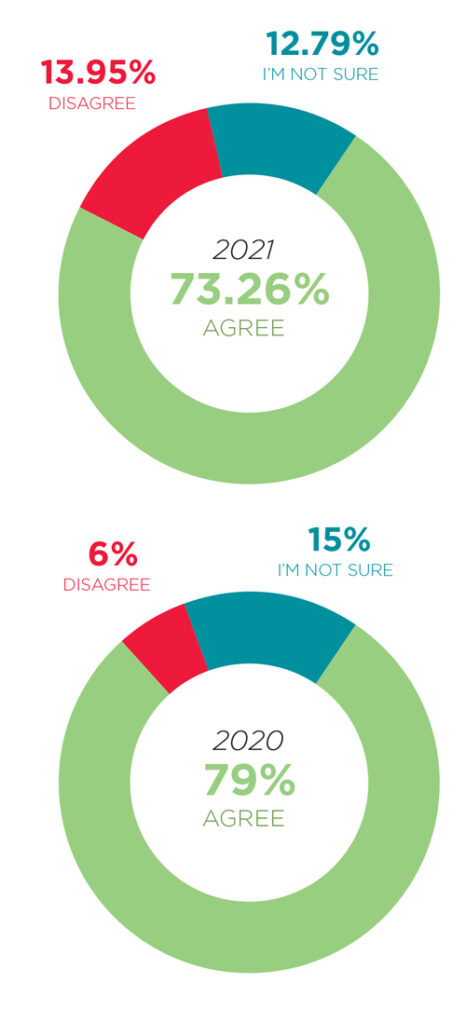
The vast majority of readers are concerned about the impacts of remote working on downtown. The responses focused on the restaurants and retail establishments negatively affected by fewer workers going out for lunch and shopping. There are many effects that remote work is having on downtown. The restaurants have had to adapt to fewer daytime customers, but many are experiencing higher evening sales because of the unique options available downtown.
The office market will require adaptation, as the new normal comes into focus. There will be some downtown office buildings that will need to be converted into other uses.
Downtown Des Moines is an attractive and dynamic part of our metro with strong amenities, housing and the best collection of restaurants. These strengths will carry downtown through the effects of the changing work habits, just as the strengths carried downtown through prior challenges since 1843 when Des Moines was founded.
Agree. Restaurants downtown are struggling. Many have eliminated lunch service because there aren’t people around. This also affects happy hours and even dinner service as people who might have stayed downtown after work have to choose to go downtown for dinner.
Jessica Dunker, president and CEO, Iowa Restaurant Association
Agree. Retailers downtown rely on the business that employees downtown bring to them during the week. With fewer events happening downtown, weekend business has also taken a hit. If downtown workers do not return, many businesses will be required to close their doors as there is not enough consumer demand to meet the costs of doing business.
Tyler Dingel, senior vice president, CBRE|Hubbell Commercial
Agree. It already has. It will take a while to modify commercial real estate not being used for alternative use.
Keith J. Gredys, chairman & CEO, Kidder Advisers Inc.
Agree. I feel the large companies are being too conservative and it is killing downtown. I see these same remote employees out at the farmers market and restaurants. If it is safe to do that, it is safe to return to work as thousands of essential workers have been doing since the pandemic began.
Brendan Comito, COO, Capital City Fruit Co.
Agree. The larger companies are the lifeblood of the downtown. Their employees utilize the restaurants and other small businesses in the area. Downtown will suffer long term if a large percentage of employees work from home. That being said, post-pandemic remote work will always need to be an option. Employees desire the flexibility and will look for a company that provides it. There needs to be a compromise.
Scott Turczynski, COO, Heartland Cos.
I’m not sure. I’m not sure about downtown small businesses as I think more people shop local than pre-2020, but restaurants and commercial buildings are sure to suffer in revenue, even if they are able to cut operating expenses. Also, employee turnover in restaurants is an additional expense.
April King, organizational change coach, American Enterprise Group
I’m not sure. Remote work, properly managed, can lead to more employee satisfaction and equal or greater productivity, and reduce negative environmental impacts. On the other hand, downtown housing may recede and some service and hospitality businesses may suffer.
Thomas Swartwood, fellow, Pappajohn Entrepreneurship Center at Iowa State University
I’m not sure. The next phase of downtown Des Moines is to make it an experience to continuously attract people there. The farmers market, the soccer stadium, Water Works Park, the skate park and ICON Water Trails create that experience. Investing in those amenities contributes to a vibrant downtown that attracts people.
Hannah Inman, CEO, Great Outdoors
Foundation
I’m not sure. Remote working will hurt, but the best businesses will figure out how to pivot to the new reality. It might be time to focus on the needs and wishes of those of us who live downtown; we’re able and willing to patronize.
Alan Feirer, owner, trainer and consultant, Group Dynamic
I’m not sure. Downtown and Des Moines overall will see a big boost as more people live close in; residents, businesses, and the city all win.
David Foster, senior consultant, Bâton Global
Disagree. I believe the market will settle on more flexibility in the work environment rather than 100% remote or 100% office. With that flexible environment some users will need more space, but just configured differently. Others will need less. Over time, I do not see this as having a major impact on our downtown environment.
Rick Tollakson, CEO, Hubbell Realty Co.
Disagree. The ability to work from home will open up flexible work hours, which can actually assist our community members’ ability to shop downtown where hours might be more limited if you are working 9-5. Commercial real estate can continue to evolve and adjust with the times. Where there used to be offices or manufacturing, there can be housing or quality of life opportunities. Our next challenge will be addressing the seniors in our communities with the aging baby boomers. Thinking proactively can alleviate current challenges and prepare for the future.
Michelle Redlinger, director, Washington Chamber of Commerce
Disagree. There is a pendulum, and it will swing!
Michael Wolnerman, vice president, pharmacy and real estate, OneroRx
Disagree. Small businesses in downtown Des Moines have already adjusted to a more geographically dispersed clientele due to the pandemic. If workers don’t return to downtown, these businesses will not notice. Commercial real estate spaces will also figure out how to adapt.
Daniel McCraine, president, McCraine Associates Inc.
Rate 1-10:
How difficult do you perceive it is for businesses to find adequate talent to fill open positions? (1 being not difficult)
Guest Editor Jake Christensen:
The consensus of the readers is that it is much harder in 2021 to find adequate talent to fill open positions. There are strong opinions across political positions on this question, ranging from “people being paid not to work” to “immigration is the key to our region’s workforce needs.”
I think that our region needs to focus our state and local resources to improve Iowa’s ability to grow and compete. We need continued improvement on: quality of life, opportunities for workforce growth, sound immigration policy improvements and educational improvements to meet the broad workforce needs of the region.
2. We’re fortunate in that new college grads are often drawn to the nonprofit sector. We have a hiring strategy that understands we will only keep them for two years. We help them build experience that makes it possible for them to seek higher-paying jobs in for-profit entities in two or three years. As long as senior team members stay, we can afford to train the state’s future workforce.
Jessica Dunker, president and CEO, Iowa Restaurant Association
7. We are currently looking for three positions within our office. Some of these positions have been open for a couple of months. Finding skilled trades talent, however, for our construction services is next to impossible. There are not enough people that want this kind of work despite how fulfilling it can be. Too many kids think that college is the answer for all career paths.
Scott Turczynski, COO, Heartland Cos.
8. Iowa has had a workforce shortage for 50 years. Our population growth is among the slowest in the U.S. This problem is going to keep getting worse – businesses need to get super tactical, seek local solutions, and leaders need to make sure the doors are really open to a diverse set of talent.
David Foster, senior consultant, Bâton Global
8. The market and employee expectations have moved.
Kevin Crowley, COO and manager, NAI Iowa Realty Commercial
8. It is challenging, but we are finding it varies widely by position. Some positions still have a very strong response from the market.
Kris Saddoris, vice president, development, Hubbell Realty Co.
9. Across all wage ranges, but for different reasons. Those at the higher end have choice, and DSM is not a destination of choice for those folks. Low cost of living is not a consideration. For those in the middle of the wage scale, it is a consideration as their dollar goes farther. For the low-wage earner, there is no incentive to move to a place where you can’t earn enough to cover your expenses. There is some interesting new mobility data that is consistent with this.
Eric Burmeister, executive director, Polk County Housing Trust Fund
9. Across the country, my partner offices struggle to find talent. It took four months to hire a good intern in Des Moines.
Ryan Hanser, president, Hanser & Associates
10. We are facing a critical shortage of nurses and direct care workers.
Tray Wade, president and CEO, EveryStep
10. People were incentivized to stay home with the unemployment bonuses. It paid to stay home. Now that they have gotten used to the lifestyle, or dread going back to their previous career, we have seen a change in what employees desire for jobs, and other outlets such as entertainment. I think we are about to see a major shift from what was, to what could be. People are realizing things don’t have to be the way it was before, and now we may see a shift in what jobs, careers and businesses people truly value. We may see some industries struggle, and new ones be born.
Steele Harter, director of economic development research, Ames Chamber of Commerce
FILL IN THE BLANK:
The best project or new initiative for Greater Des Moines in 2022 is _______.
Guest Editor Jake Christensen:
“It is impossible to pick just one” was a very accurate assessment from one of the respondents. Greater Des Moines has several impact projects and initiatives that will result in a stronger, more desirable region. The ripple effect of completed projects like the MidAmerican Rec Plex and the Lauridsen Skatepark are two quality of life projects that are already contributing to the vitality of the region. Future projects like the ICON Water Trails and the Des Moines airport terminal are two projects that are in the works, but still sourcing investment that will leave decadeslong imprints on the region. Planning initiatives like the Downtown Vision Plan and Capitol Crossroads 3.0 are both efforts to continue to shape our region and set goals for an even better metro area.
Increased attention for people to participate in local city and school elections.
Carol Olson, state director, U.S. Senate
I am excited about the new soccer stadium. That will be a great benefit to Des Moines, bringing lots of dollars to here. Also, the skatepark has helped accentuate what Des Moines has to offer by all of the great publicity it has brought. I have met several people that brought their families to Des Moines from other communities just to use the skatepark. That means more money to the metropolitan area.
Robert Lewis, owner, Quester
Airport expansion.
Rowena Crosbie, president, Tero International Inc.
Downtown development.
Kenneth Stinson, principal, Northwestern Investments
Center @ 6th.
Susan Fitzsimmons, vice president and general counsel, Christensen Development
The cleanup of the Dico site and replacement with a new soccer stadium and the amenities that will come with it.
Tyler Dingel, senior vice president, CBRE|Hubbell Commercial
Bucs arena at Merle Hay Mall.
Jennifer Cooper, vice president, Bankers Trust Co.
Entertainment venues.
Terry D. Nielsen, president and CEO, Raccoon Valley Bank
Refugee resettlement.
Eric Burmeister, executive director, Polk County Housing Trust Fund
ICON Water Trails. Construction of the Scott Avenue dam mitigation project will begin in 2022. This will be the first of the three major downtown projects that will help all of us attract and retain our workforce.
Rick Tollakson, CEO, Hubbell Realty Co.
Airport expansion infrastructure.
Steve Heston, director, client engagement, Pratum

